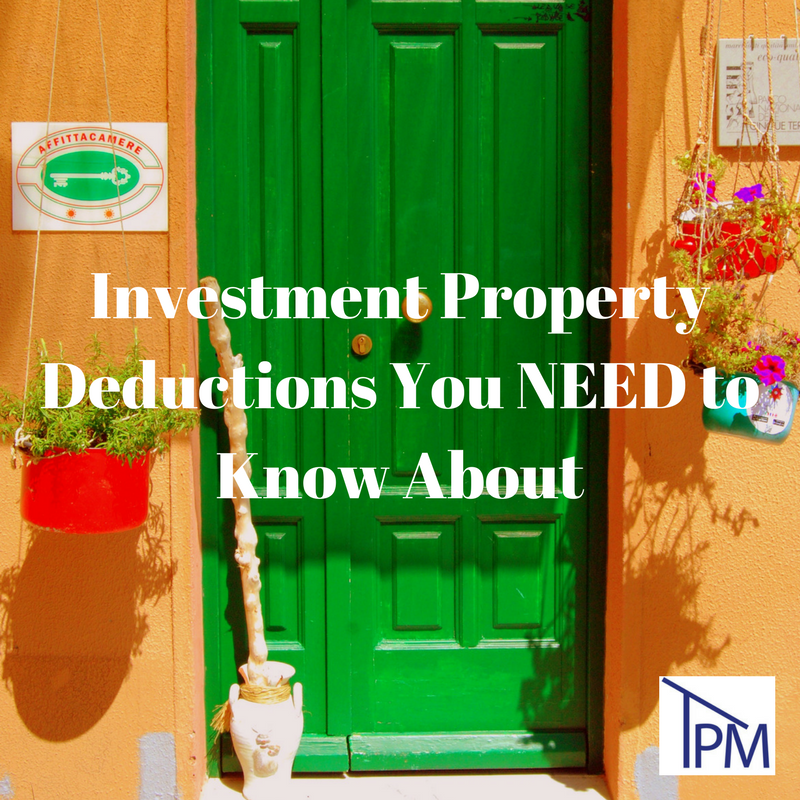Investment Property Tax Deductions You Need to Know About
Being a landlord can get expensive! It’s especially expensive if you do not know what deductions you are missing out on. Remember correct documentation is always important when dealing with the IRS. The most important thing would be to check the guidelines with the IRS website to be sure everything matches with your state.

Repairs
Probably one of the biggest things that you will deal with being a landlord. The cost of “necessary” repairs are fully deductible within the year they are done. I put “necessary” in quotes because there is a marked difference between a necessary repair/update and a remodel just for the sake of remodeling. Repairs are inevitable so keep every repair or maintenance task expense detailed somewhere safe. Keep all your receipts! Be sure to include any labor done by carpenters, electricians, landscapers, gardeners, roofers, carpet-layers, painters, housekeepers and carpet cleaners (if these expenses aren’t coming out of your tenant’s pocket). You can include the cost of equipment, materials, and any other things you might use for the repair. Be sure to get a Tax ID number from every contractor you employed throughout the year. If you paid them more than $600, you will need to submit a 1099 for them. Every employee that you paid less than $600 to will not require this, but you will still be able to deduct the payment as an expense.
Employee Wages
This is separate from repairs. You may have additional people helping you manager your investment properties. After all, managing a property is a lot of work! Especially at the beginning and end of a lease. If you hired anyone to help you answer phone calls, show potential tenants your property, etc. and you paid them, be sure to keep track of it!
Interest and Depreciation
Mortgage interest, interest on primary loan, interest on second loan, interest on money you don’t legally own… you name it, you can deduct it! To be eligible for depreciation, you must the property and be using it to produce income. Depreciation deductions should span over several years of owning the property so be able to determine your property’s “useful life” to accurately report its depreciation. Remember depreciation is about allocating the cost of the property – not necessarily marking a decline in value. So even if your home stays in remarkable condition, you will still make allowances for depreciation.
Remember to keep track of any improvements or remodeling you’ve done. Now this is separate from “necessary” or “reasonable” expenses as listed above. With repairs, you delineate those expenses the same year they are done. With improvements like replacing the roof, adding carpeting, installing a new system, etc., you depreciate their value of their useful life just like you do for the property itself.
Travel
Local travel should be recorded for anything you do regarding the investment property. This can be done by two ways either by doing it by the standard mileage rate (IRS standard) or my deducting by your expenses such as gas or repairs on your car. Long distance travel can be recorded too! This is tricky because you must record everything and your trip must be primarily for handling something “necessary and ordinary” regarding your property.
Expenses can include 100% of your lodging, gas, rental car, airfare, luggage transport, etc. However, you can only include 50% of your meal expenses.
Home office
Home offices should meet certain IRS requirements such as “regular and exclusive use”. If you meet these requirements, then be sure to take credit for having one!
Self-explanatory deductions
Casualty/theft losses, insurance premiums, and legal/professional services.
Commonly Overlooked Deductions
These are often expenses you would never think to write down. Keep a journal or spreadsheet to help you keep it all straight!
Business Meals
Utility Costs (whether you are partially or completely responsible)
Rented or Purchased Equipment
Advertising Fees
Property Management Fees (if you don’t manage the property all by yourself)
If all this overwhelms you, make life a little simpler and hire a professional property manager to help ease the burden. You will of course get reimbursed for interest, depreciation and other personal expenses still, but your property manager can take care of repairs and expenses when it comes to finding and securing a tenant (i.e. background checks, credit checks, etc.). You will then be able to deduct your property manager fees (usually around 10% of the rent) off your income. You can call us any time at: 970-259-0222.
Sources:
http://www.nolo.com/legal-encyclopedia/top-ten-tax-deductions-landlords-29497.html
https://www.irs.gov/uac/must-know-tips-about-the-home-office-deduction
https://rentpost.com/blog/advice/8-overlooked-tax-deductions-property-managers/



